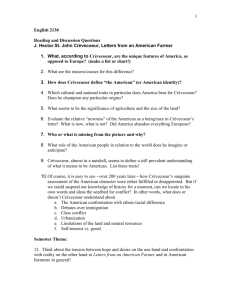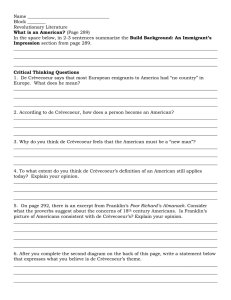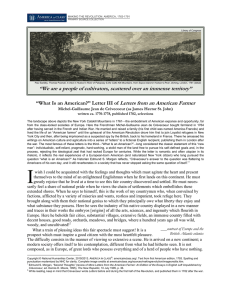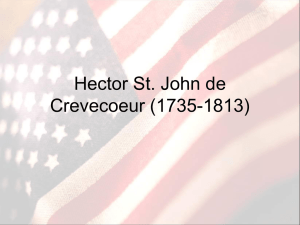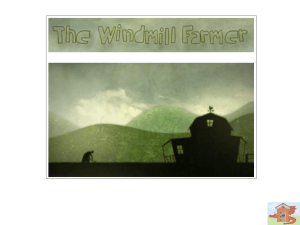J. Hector St. John de Crevecoeur
advertisement
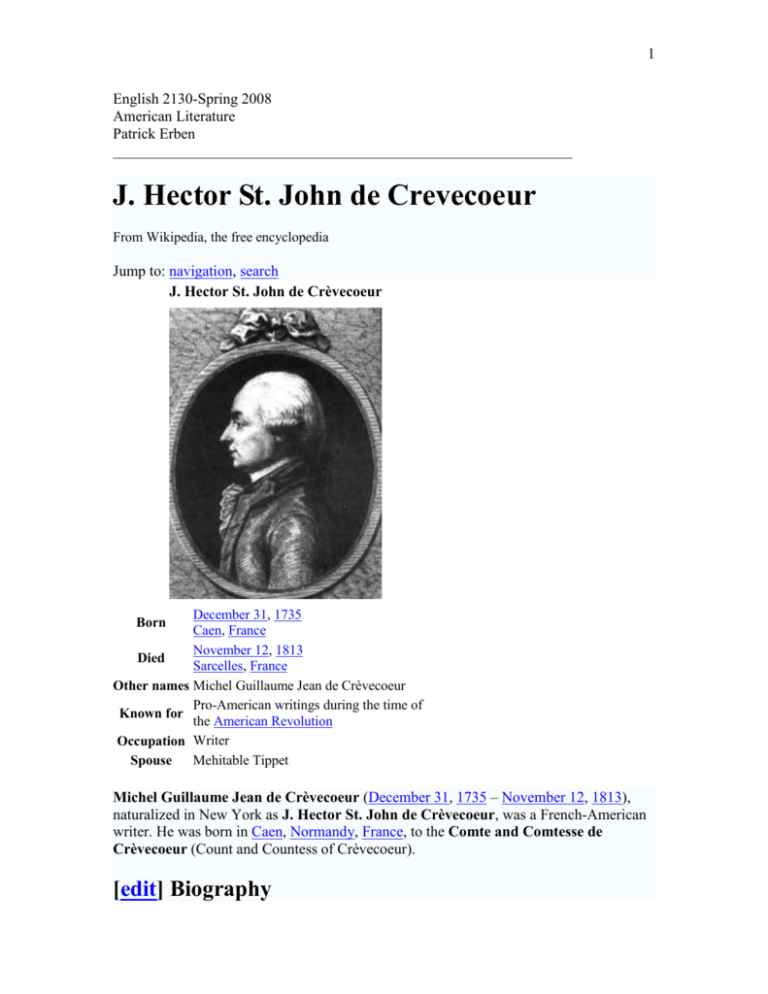
1 English 2130-Spring 2008 American Literature Patrick Erben _____________________________________________________________ J. Hector St. John de Crevecoeur From Wikipedia, the free encyclopedia Jump to: navigation, search J. Hector St. John de Crèvecoeur December 31, 1735 Caen, France November 12, 1813 Died Sarcelles, France Other names Michel Guillaume Jean de Crèvecoeur Pro-American writings during the time of Known for the American Revolution Occupation Writer Mehitable Tippet Spouse Born Michel Guillaume Jean de Crèvecoeur (December 31, 1735 – November 12, 1813), naturalized in New York as J. Hector St. John de Crèvecoeur, was a French-American writer. He was born in Caen, Normandy, France, to the Comte and Comtesse de Crèvecoeur (Count and Countess of Crèvecoeur). [edit] Biography 2 In 1755 he emigrated to New France in North America. There, he served in the French and Indian War as a surveyor in the French Colonial Militia, rising to the rank of lieutenant. Following the British defeat of the French Army in 1759 he moved to New York State, then the Province of New York, where he took out citizenship, adopted the English-American name of John Hector St. John, and in 1770 married an American woman, Mehitable Tippet. He bought a sizable farm in Orange County, N.Y., where he prospered as a farmer and took up writing about life in the American colonies and the emergence of an American society. In 1780, during the American Revolution, the faltering health of his father forced him to travel to Europe. Accompanied by his son, he crossed British-American lines to enter British-occupied New York City, where he was briefly imprisoned as an American spy. Eventually, he was able to leave for Britain. In 1782, in London, he published a volume of narrative essays entitled the Letters from an American Farmer. The book quickly became the first literary success by an American author in Europe and turned Crévecoeur into a celebrated figure. He was the first writer to describe to Europeans--employing many American English terms--the life on the American frontier and to explore the concept of the American Dream, portraying American society as characterized by the principles of equal opportunity and selfdetermination. His work provided useful information and understanding of the "New World" that helped to create an American identity in the minds of Europeans by describing an entire country rather than another regional colony. The writing celebrated American ingenuousness and its uncomplicated lifestyle and spelled out the acceptance of religious diversity in a melting pot being created from a variety of ethnic and cultural backgrounds. His application of the Latin maxim "Ubi panis ibi patria" to early American settlers also shows an interesting insight. From Britain, he sailed for France, where he was briefly reunited with his father. When the United States had been recognized by Britain following the Treaty of Paris in 1783, Crevecoeur returned to New York City. He learned that, in his absence, his wife had died, his farm had been destroyed, and his children were now living with neighbors. Eventually, he was able to regain custody of his children. For most of the 1780s, Crèvecoeur lived in New York City where he now served as the French consul for New York, New Jersey and Connecticut. In 1784, he published a two-volume version of his Letters from an American Farmer, enlarged and completely rewritten in French. A threevolume version followed in 1787. Both his English and his French books were translated into several other European languages and widely disseminated throughout Europe. For many years, Crèvecoeur was identified by European readers with his fictional narrator, James, the 'American farmer', and held in high esteem by readers and fellow-writers across Europe. When he published another three-volume work in 1801, entitled Voyage dans la Haute-Pensylvanie et dans l'état de New-York, however, his fame had faded, and his book was ignored. An abbreviated German translation appeared in the following year. An English translation only appeared in 1964. Much of his best work has only been published posthumously, most recently as More Letters from the American Farmer: An edition of the Essays in English Left Unpublished by Crèvecoeur, edited by Dennis D. Moore (Athens, Georgia: University of Georgia Press, 1995). 3 In 1789, during a stay in France, he was trapped by the political upheaval that was quickly turning into the French Revolution. As an aristocrat, he soon went into hiding, while secretly attempting to gain passage to the United States. The necessary papers were finally denied to him by the new American ambassador to France, James Monroe, in 1794. Crèvecoeur then settled permanently in France. On November 12, 1813, he died in Sarcelles, Val d'Oise, France. He is the namesake of St. Johnsbury, Vermont at the suggestion of Ethan Allen. [edit] Selected criticism Gay W. Allen, An American Farmer. New York: Penguin Books, 1987 Thomas Hallock, From the Fallen Tree: Frontier Narratives, Environmental Politics, and the Roots of a National Pastoral. Chapel Hill: University of North Carolina Press, 2003 David Eisermann: Crèvecoeur oder Die Erfindung Amerikas. RheinbachMerzbach: CMZ-Verlag, 1985 [edit] External links Works by Michel Guillaume Jean de Crèvecoeur at Project Gutenberg Works by John Hector at Internet Archive What Is An American? abstract at shvoong.com ________________________________________________________________________ Reading and Discussion Questions J. Hector St. John Crèvecoeur, Letters from an American Farmer 1. What, according to Crèvecoeur, are the unique features of America, as opposed to Europe? (make a list or chart!) 2. What are the reasons/causes for this difference? 3. How does Crèvecoeur define “the American” (or American identity)? 4. Which cultural and national traits in particular does America bear for Crèvecoeur? Does he champion any particular origins? 5. What seems to be the significance of agriculture and the size of the land? 6. Evaluate the relative “newness” of the American as a being/race in Crèvecoeur’s letter! What is new, what is not? Did America abandon everything European? 4 7. Crèvecoeur wrote this portion of Letters from an American Farmer (first published 1782) before the American Revolution. Can you find any elements in this letter anticipating the conflict? 8. Who or what is missing from the picture and why? 9. What role of the American people in relation to the world does he imagine or anticipate? 10. Crèvecoeur, almost in a nutshell, seems to define a still prevalent understanding of what it means to be American. List these traits! 11. Of course, it is easy to see—over 200 years later—how Crèvecoeur’s sanguine assessment of the American character were either fulfilled or disappointed. But if we could suspend our knowledge of history for a moment, can we locate in his own words and ideas the seedbed for conflict? In other words, what does or doesn’t Crèvecoeur understand about a. The American confrontation with ethnic/racial difference b. Debates over immigration c. Class conflict d. Urbanization e. Limitations of the land and natural resources f. Self-interest vs. greed Semester Theme: 12. Think about the tension between hope and desire on the one hand and confrontation with reality on the other hand in Letters from an American Farmer (we will later read his letter on slavery…) and in American literature in general!
